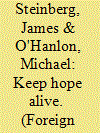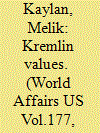|
|
|
Sort Order |
|
|
|
Items / Page
|
|
|
|
|
|
|
| Srl | Item |
| 1 |
ID:
131995


|
|
|
|
|
| Publication |
2014.
|
| Summary/Abstract |
Within the scholarly debate on the current power transition in the international system, particular importance is attached to China's economic rise and the global shifts it is bringing forth in material primacy. A thorough understanding of these shifts in the relative distribution of power, however, requires leaving the narrow path of material capabilities and looking at normative accounts as well. Taking up this challenge, the article focuses on the political dimension of China's rise by exploring the country's alignment with South American governments along two dimensions: the convergence of their foreign policy ideas and the provision of diplomatic links facilitating their cooperation and coordination in global politics. The empirical analysis depicts a nascent global agenda forming between China and certain South American countries and shows that, along with growing levels of foreign policy compatibility, China has also advanced its diplomatic inroads into the region, particularly at the level of bilateral relations. Taking these developments as a whole, it is suggested that China has gained international attraction in terms of its visions of global order and as a potential political partner throughout the region. The article concludes with a discussion of the findings in light of the ongoing relative shifts in the distribution of global power beyond material primacy, and the prospects for China's further political rise.
|
|
|
|
|
|
|
|
|
|
|
|
|
|
|
|
| 2 |
ID:
132152


|
|
|
|
|
| Publication |
2014.
|
| Summary/Abstract |
At their summit in California last June, U.S. President Barack Obama and Chinese President Xi Jinping committed themselves to building trust between their countries. Since then, new official forums for communication have been launched (such as the military-to-military dialogues recently announced by the two countries' defense ministers), complementing existing forums such as the Strategic and Economic Dialogue (which features the countries' top diplomats and economic officials). But despite these efforts, trust in both capitals -- and in the countries at large -- remains scarce, and the possibility of an accidental or even intentional conflict between the United States and China seems to be growing. Given the vast potential costs such a conflict would carry for both sides, figuring out how to keep it at bay is among the most important international challenges of the coming years and decades. The factors undermining trust are easy to state. East Asia's security and economic landscape is undergoing massive, tectonic change, driven primarily by China's remarkable economic rise in recent decades. That economic miracle, in turn, has made it possible for China to increase its military capacity and ramp up its political role in the region and beyond. China's leaders and prominent strategists have been at pains to insist that China's rise will be peaceful and poses no threat to its neighbors or the existing international political and economic order. But many members of the world community remain concerned and even skeptical, noting that history and international relations theory are replete with examples of conflict arising from clashes between a dominant and a rising power."
|
|
|
|
|
|
|
|
|
|
|
|
|
|
|
|
| 3 |
ID:
130236


|
|
|
|
|
| Publication |
2014.
|
| Summary/Abstract |
After Forbes magazine named Vladimir Putin the most powerful man in the world, a status he has surely consolidated by overseeing the Winter Olympics and the invasion of Crimea, one heard a great deal of media talk about the Russian leader's wily skills in playing the global geostrategic "game." What one didn't hear, what one virtually never hears, even from highly experienced Western commentators on Russian affairs, is anything about Putin acting according to principles or pursuing actions according to a coherent ideology. Not surprising, you might say, since the man obviously has no such concerns-other than a will to win, for himself and his seat of power; no vision comparable to that of the Kremlin in the old Soviet Union, which furnished it and its allies with a huge asset and a troublesome headache in the form of an armory of fully rationalized ideas that legitimized a predictable approach to international relations and even provided the regime with a perverse "morality."
|
|
|
|
|
|
|
|
|
|
|
|
|
|
|
|
|
|
|
|
|